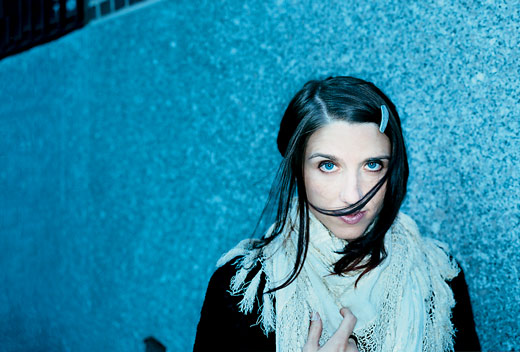
Even after being shaken from sleep by MAGNET’s early-morning phone call, Jolie Holland has a unique way—part eyeshades-wearing analyst, part streetwise tough girl—of getting her point across.
“I don’t give a shit about so much art, because it doesn’t give enough, doesn’t sacrifice enough,” says the 32-year-old singer/songwriter, who recently relocated from San Francisco to Brooklyn. “I don’t bother writing about something that’s not important to me.”
On The Living And The Dead (Anti-), Holland’s fourth album, “important” is just another word for nothing left to lose. For death. For the life-altering events that form the core of the all-too-human drama Holland writes about with a storyteller’s knack for dramatic narrative and a Basement Tapes junkie’s taste for creaky melodies. Since leaving acclaimed Vancouver old-time act the Be Good Tanyas in 2001, Holland has charted her own strong-willed course, fearlessly blending the musical traditions she grew up with in the South (folk, country blues, Tex-Mex, roots rock) while giving voice to a cast of characters whose lives have been lived in the shadowy back alleys of what writer Greil Marcus once called the “old, weird America.”
On The Living And The Dead, this assumes any number of forms, from ruminating about an old friend whose drug addiction has grown so desperate that Holland fails to recognize him on the street (“Corrido Por Buddy”) to a woman whose jealousy moves her to murder her lover (“Love Henry”) or the traveler whose Kerouac-like exploits have left a breadcrumb trail of human wreckage behind him (“Mexico City,” co-written by M. Ward). As it turns out, a key part of tapping into the macabre vibe required for such an album came in the form of the vintage instruments Holland used to create it and the longtime heroes, such as guitarist Marc Ribot, with whom she collaborated.
“I have a 1948 Epiphone archtop acoustic, [which is] the guitar you hear on most of the record,” says Holland. “I was a street kid; my experience as a musician is that I never had any lessons, so friends taught me stuff; I played music on the street, stayed in squats. All my friends are these broke-ass, derelict artists, and that background gives you a certain mentality: ‘You can’t really afford anything nice, but you can probably find something free that’s old, and maybe even nicer than something expensive and new.’ Dead people have played [that guitar], which is weird to think about. I live for that kind of stuff.”
Holland comes by her fascination with morbidity honestly enough. Her Scottish forebears moved to Texas on a Spanish land grant several generations ago, and her experiences as an itinerant Southerner (with stints in Houston, Austin and New Orleans) have given her a unique perspective about how this lifetime relates to those that came before it.
“My family’s from New Orleans, and part of that family is African and Native American, which forms the cultural roots of voodoo,” she says. “One of the spiritual pillars of voodoo culture is that your ancestors are always with you. People may not necessarily remember (my grandfather) Julius Otto Jackson, but they’ll have this image of a badass Texas tough guy, whose spirit local priests then mediate so that he becomes part of the community. Then you pay that mediator dude in chickens and goats.” She laughs. “He communicates with your ancestors on your behalf, who might tell you to go take your goats to be inoculated or something.”
It’s exactly this kind of cockeyed, patchwork-quilt worldview that’s colored Holland’s work since the release of 2003 solo debut Catalpa, a collection of home-recorded demos that earned her a Shortlist Music Prize nomination from fan and labelmate Tom Waits. Each album has been bolder than the one before it, unleashing Holland’s voice, an amalgam of Billie Holiday and Big Mama Thornton. On The Living And The Dead, it serves an observant-yet-wandering eye that recently landed on a fellow seeker and Southerner.
“I’d never heard Daniel Johnston before I started recording this album,” says Holland, who received a mix tape of Johnston’s outsider pop songs from guitarist and friend Stefan Jecusco. “It totally changed my life. Within five minutes of listening to his tape, I’d written a song. It’s like getting the right food at the right time. Your body is like, ‘Come on, man, I’ve gotta make more tears, so where’s the nutrients?’ You eat the right thing and you’re cool again for a while.”
—Corey duBrowa







2 replies on “Jolie Holland: Songs About Death And Texas”
I didn’t say a lot of that stuff, or it was taken way out of context. oh well. I certainly didn’t say “I live for that kind of stuff” in reference to my old guitar. The voodoo references I made were entirely mis-represented, and Stefan Jecusco is not a guitarist–he is a banjo player. And M Ward co-produced that “Mexico City.” He didn’t co-write it. And “Mexico City” was about Kerouac, not about someone ‘Kerouac-like.’ I didn’t say the first quote–“I don’t give a shit about so much art, because it doesn’t give enough, doesn’t sacrifice enough.” What I said was “I don’t give a shit about art that doesn’t give enough.” Its hard for me to make head or tails of the statement as it was published. In any case, thanks for publishing an article about me.
Jolie — my bad about the inaccuracies re: Stefan’s contribution to the album and Matt’s role on “Mexico City” (and thank you for correcting these points in our forum). But otherwise everything that’s in the story is exactly the way it came out of my tape recorder — for better or worse! All of this said, we love you and your music and hope you won’t hold any of our interpretations (right, wrong, cockeyed) against us.